#Thucydides
Text
sometimes i think about nicias at the sicilian expedition and i have to laugh. wdym u delayed leaving sicily because the moon was giving off bad vibes. dude your men are going to die.
#nicias#thucydides#I LAUGH ABIT thinking about how alcibiades (who wanted this expedition) didnt even get to see this one through#alcibiades#.... my beloved himbo
28 notes
·
View notes
Text
According to Thucydides, the expedition to Sicilly wasn't the largest the athenians ever had, in terms of numbers, but it was so impressive partly becuase it was insanely fancy. Everyone was trying to outdo each other with fancy luxurious and super fast ships and fancy armor and weapons and some rowers were getting paid double and overall so so much money was being spent.
That's the Alcibiades influence I guess.
167 notes
·
View notes
Text
Somebody stop me from making these.


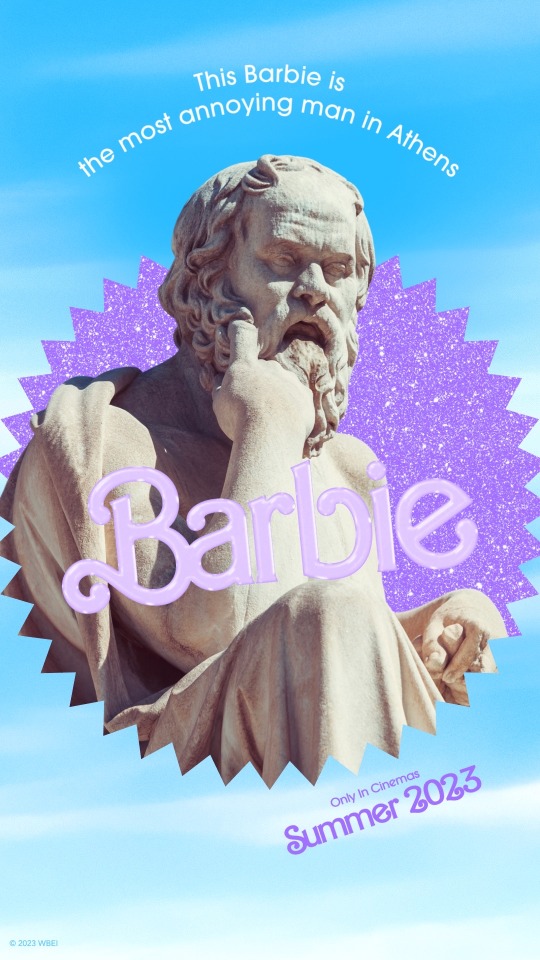
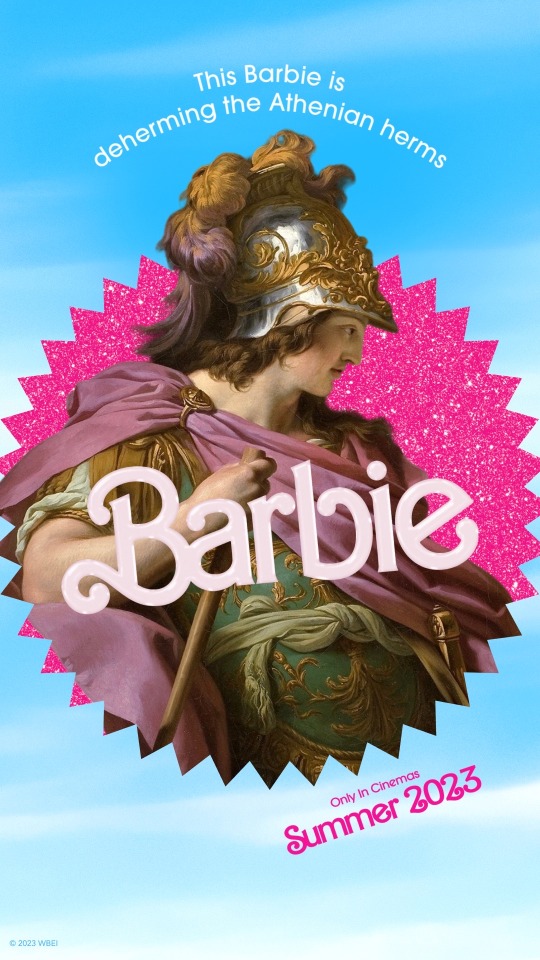

Bonus: the autogenerated text the website gave me when I uploaded Alcibiades and Achilles’ images:


Thank you to @gallopinggallifreyans and @mythosphere for helping me with these! The de-herming one was entirely @mythosphere’s idea.
#edited to add in an extra meme since this was entirely hellenist. the romans get one (1) meme#tagamemnon#odysseus#croesus#socrates#alcibiades#achilles#greek mythology#homer#the odyssey#the iliad#troy 2004#herodotus#thucydides#original post#meme dump
280 notes
·
View notes
Text
an Athenian general called Aristocrates sounds like satire, And Yet,
137 notes
·
View notes
Text
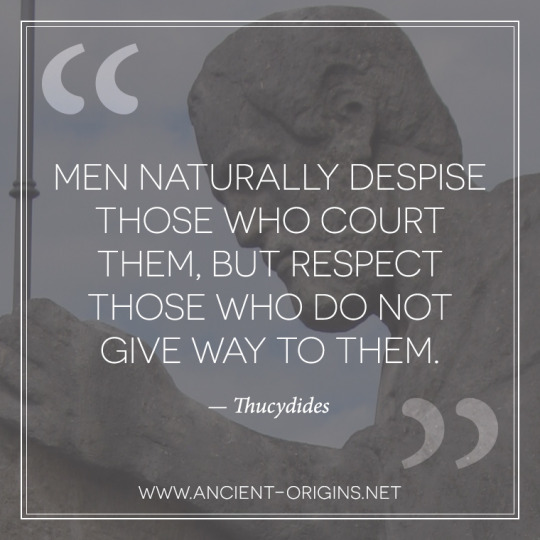
Quote of the day...
23 notes
·
View notes
Text

Μακαρίσαντες υμών το απειρόκακον ού ζηλούμεν το άφρον.*
Thucydides
Although we bless your ignorance of evil, we do not envy your stupidity.*
My eldest sister, a neurologist, sent me this. She didn't know whether to laugh or cry.
So a lesbian is defined by what she isn’t in relation to men? That’s progressive! Does it also mean that a Transwoman is really a Trans-Non-Man? And they can define a man but still not define a woman? It's pure gibberish.
Louisa May Alcott’s "Little Non-Men" doesn't quite have the same ring to it, does it?
American gender ideology is the cultural waste land of misogyny. The lunatics have well and truly taken over the asylum. This is beyond parody or embarrassing.
#thucydides#greek#classical#quote#gender ideology#gender#american wokery#woke#anti-woke#culture#american culture war#culture wars#men#non-men#woman#male entitlement#misogyny#biology matters#science#johns hopkins#university#academia
87 notes
·
View notes
Text
Can you even imagine the moment that exiled Alkibiades showed up in Sparta?
Started having a hand in policy?
Started boning the king’s wife?
The average very Spartan Spartan must’ve been absolutely losing his shit.
49 notes
·
View notes
Text
Right, as the world goes, is only in question between equals in power, while the strong do what they can and the weak suffer what they must.
Thucydides (c. 472 – c. 400 BCE), Greek historian, in History of the Peloponnesian War, Book V, 5.89-[1] (Crawely tr.)
7 notes
·
View notes
Text
Herodotus and Thucydides: Greek Historiography and Intellectual History of the 5th century BCE
"Brief description of the course
The course offers an opportunity to study the fascinating works of two most important and interesting Greek writers and intellectuals of the 5th century BCE who invented history, or at least the writing of it: Herodotus and Thucydides. For all their differences, Herodotus and Thucydides both set out to explore, and to make sense of, historical developments and forces that shaped human society and the world they lived in. Both engaged in an intricate intellectual dialogue not only with earlier Greek poetry and thought, but also with many new, often radical political, religious, and scientific ideas and theories that emerged in the 2nd half of the 5th century BCE. Yet in doing so, they developed diametrically opposite modes of historical thinking as well as fundamentally different visions of the universe and man's place in it. We will look carefully at, and compare, the most important aspects of their groundbreaking and highly experimental works in the context of Greek literary, cultural, and intellectual history of the archaic and classical ages. Attention will also be paid to the reception of their works, and their philosophies of history, in the Western tradition, from Plutarch and Tacitus to Hobbes and Marx."
This is a relatively old seminar (2016, under the direction of Pr. Michael Lurie), but I find that its presentation that I reproduced above and its more particular thematology (which can be found at the link that I give) are extremely interesting and enlightening. I don't know whether the lectures from this seminar have been published in form of book or on the net, something which would be very felicitous.
5 notes
·
View notes
Text
*Early Peloponnesian war*
Pericles: In a bad state right now. Not mentally, I’m just in Athens
#swear every single event is the Athenians asking to go on an expedition and Pericles just#having a moment#really like dealing with small children#classics memes#tagamemnon#ancient greek#ancient history memes#ancient history#ancient literature memes#thucydides#peloponnesian war#pericles
40 notes
·
View notes
Text
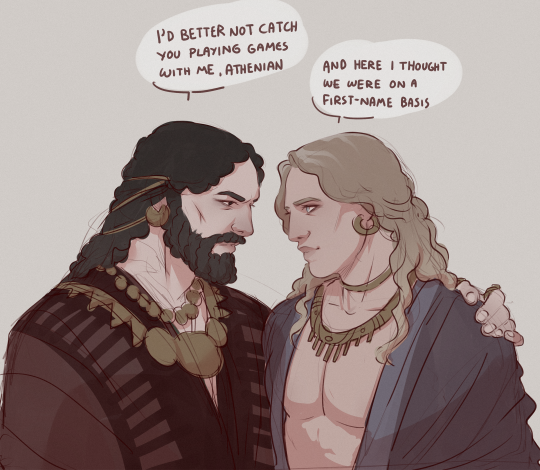
Alcibiades and Tissaphernes being besties in 411 BCE
#ancient greece#thucydides#tagamemnon#i wish thucydides was alive so i could show him art of his OCs#next up: alcibaides chained to a wall bc he got caught playign games#Alcibiades
487 notes
·
View notes
Text
Archaic/Classical Greek Authors and Whether I Could Win Against Them in a Fight (Part 1)
Homer: This one depends on how I interpret the question. Homer as he’s thought of in the classical world? Absolutely I could take on a (probably fictional) old blind poet. Homer as in all the people who likely had a role in constructing The Iliad and The Odyssey? I do not stand a chance against that mob.
Hesiod: Oh yeah no problem. I’ll just, like, flutter my eyelashes or throw a bucket of bath water at him and he’ll run away screaming like the woman-fearer he is.
Sappho: Yes I could win against her in a fight, but why would I want to? I don’t have any beef with Sappho. I’d much rather befriend her.
Herodotus: This one’s going to be close, you guys. On the one hand, as a man in Classical Greece he has military training. On the other hand, I have a more balanced diet and most importantly, rage on my side. I think ultimately, his greater experience in combat will tip the scales.
Thucydides: Fuck no. That man fought a war against Sparta and survived. He caught the Plague of Athens and lived to tell the tale. His Greek sentences alone make me want to die. He would squash me like a bug.
Xenophon: Ah, Xenophon, nobody’s favourite author. Again, he has a ton of military experience. Could kill me easily. What an underwhelming end, to be killed by Xenophon of all people.
#i’m aroace but feel free to replace “befriend” with “kiss” in the sappho entry#gonna do a part 2 with the philosophers and playwrites later#spoiler alert: i’m befriending euripides#apologies to any xenophon fans out there. i’m just teasing him i promise#classics#tagamemnon#homer#hesiod#sappho#herodotus#thucydides#xenophon#original post#shitpost#esmer says things
66 notes
·
View notes
Text
girl what were YOU doing at the parodies of the Mysteries in private houses 👀
20 notes
·
View notes
Text
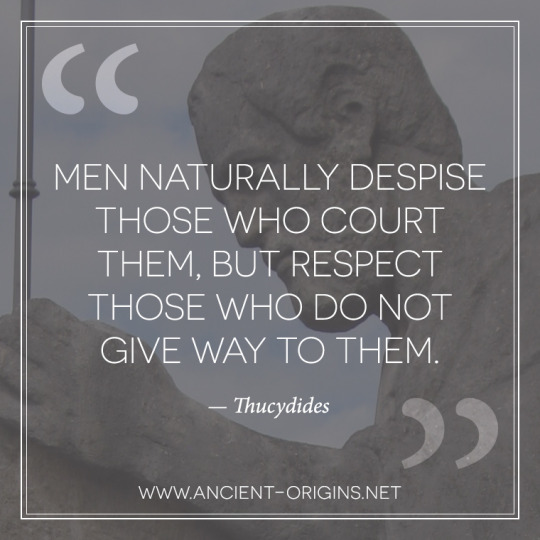
Quote of the day...
15 notes
·
View notes
Text
Anonymous asked: I’m a college adjunct professor in the liberal arts and I confess I like plenty of your posts on your blog which give food for thought, the rest of it I violently disagree. Despite your Oxbridge education in the Classics I’m perplexed that a blog dedicated to high culture should spend time glorifying war. I get that you served in Afghanistan with the Royal Army as a combat pilot so that’s your lived experience. My question is why do you post on military history, especially classical civilization, which just glorifies dead white men? Isn’t the study of classics passé today? I don’t see what our progressive society can possibly learn from dead Greeks and Romans.
Thank you for reaching out and I appreciate your comments. Let me get a few things out of the way before I get to the heart of your question. I’ve never understood the term violently disagree, what does that even mean? Does it mean resorting to violence to further or finish an argument? I hope not.
I don’t mean to pick on you but I find it weird that it’s often modern educated liberal leftists (and their far right counterparts I should add) who’ve never seen real violence or been violent themselves - because they’re benignly bourgeois and happy to comment on things that outrage them from the safety of the sidelines - but leave the actual fighting in a real war to others.
In the British case it’s the working class and the upper middle and upper classes (the historic structure of the British army) but in the US the vast majority of those who serve come from blue collar and middle class backgrounds but not the well off college educated elite, so that progressives and everyone else for that matter can enjoy the comfortable bourgeois lives they lead but happily shit on the sacrifices of the very same people who fight for the way of life they take for granted.

Anyway, I’m venting, and for that I apologise. Of course we can disagree but I hope not violently. I prefer civility regardless of how passionate one’s beliefs are. There’s no point winning an argument if you don’t win over the person too. In that spirit let us continue.
I’m not going to defend the study of Classics as a whole here. I’ve addressed that question elsewhere in my blog and perhaps it would make my tutors at Cambridge blush but here’s my piss poor attempt nonetheless (click on this link to the blog post)
Otherwise there are plenty of excellent Ancient Greek and ancient world related blogs well worth your time to browse through and even learn from about the importance of the ancient world. Here are just a few:
I would recommend the following:
https://gemsofgreece.tumblr.com/
https://www.tumblr.com/alatismeni-theitsa
https://wordsmithic.tumblr.com/
https://thoodleoo.tumblr.com/
Just another house keeping point. It may sound trivial but it’s important. It’s just the British Army not the Royal British army. I’m assuming you’re American and so it’s understandable that you’re more likely to make that error because you’re not British. We have a Royal Navy and even a Royal Air Force but curiously not a Royal Army. Why that is so is rooted in our peculiar British history going back to Charles I and II. The Royal Navy was always loyal to the monarchy during the war with Parliament and so it kept the Royal bit. The army not so much. Indeed the origin of the British army was Cromwell and his famed New Model Army, in other words, it was an instrument of Parliament. Since the restoration of the throne all army officers and soldiers swear an oath of loyalty to the reigning monarch.

But it’s also true there is alternative legitimate argument that there never has been a British army per se, just a tribal collection of regiments with their own roots to a community, proud traditions and rituals unique to that regiment, and fiercely guarded independence.
The argument goes that the British Army actually goes further back than the English civil war of Cromwell and Charles I. A monarch would raise a force by calling on his nobleman to call their own men from their lands to arms and fight for him (a regiment). Only a very, very small proportion of an army would be directly paid and commanded by the monarch. By contrast, as far back as the Saxon period, English/British monarchs have maintained a fleet of warships at their own expense.

From the Restoration onwards there were still lingering distrust between Parliament and the monarchy, especially over the issue of a standing army, which was seen as totally opposed to the liberty of the nation. The Bill of Rights in 1689 stipulated that a standard army could only be paid for by Parliament, even if the monarch was the nominal commander-in-chief. This meant that Parliament had to repeatedly allocate money from the Treasury to fund the army, which meant that it regularly had to pass Acts to do so. If Parliament didn’t pass those Acts, the army would cease to exist. It existed at the behest of Parliament and was, therefore, not the monarch’s property. It was therefore not Royal.
Today a Corps Warrant is the formal document that legally establishes the various regiments and corps of the British Army for the purposes of the Armed Forces Act 2006. This reflects the historical origins of these unique regiments or corps, which were raised on the authority of the Sovereign, usually by a named individual and by means of a royal warrant or commission granted for that purpose.
Now to get to the heart of the questions you raised.
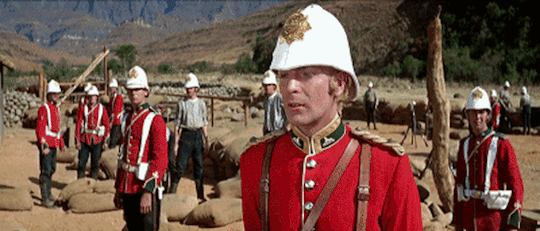
I hope to God I don’t glorify war. If I am guilty of anything it is recognising the sacrifices those in uniform have made for the societies they serve (forgetting for the moment the legitimacy of war or how war is waged by their political masters). Anyone who has gone to war or experienced war does not glorify war. They bear the brunt of what the cost of war is - they witness the death of a comrade in arms or silently observe the ashen corpses that were once living and breathing men, women, and children. Surviving is the only glory of war.
I have to take issue with your very rosy picture that society and culture would run just fine without war, when history has shown it is its engine. No one put it in a more pithy way than Orson Welle’s amoral character Harry Lime in that class film The Third Man, “In Italy, for 30 years under the Borgias, they had warfare, terror, murder and bloodshed - they produced Michelangelo, Leonardo Da Vinci and the Renaissance. In Switzerland, they had brotherly love and 500 years of democracy and peace, and what did they produce? The cuckoo clock!”
Society - let alone a culture - does not operate in a vacuum. Something gives birth to society. In this case war gives birth to society, however unpalatable that truth affects your progressive sensibilities. “War is the father of all things”, Heraclitus wrote.
In fact, most of human history is about war; war shaped societies; war made people rich; war made people poor; war destroyed cultures; war shaped cultures; war brought religions; war entertained; war was waged for nothing; war was waged for everything. Do you know honestly believe in your understanding of world history that only these so-called dead white men of Greece and Rome waged war? If you do, then I question how historically illiterate your understanding is of non-Western history.
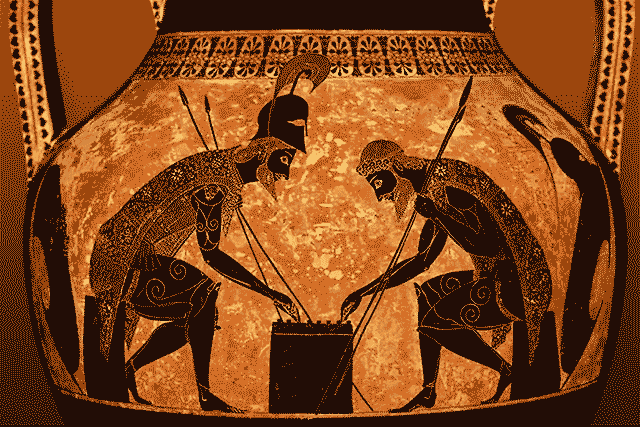
It is only fitting that humankind’s first true historian was a general and it just so happens he was a Greek. Thucydides of Athens was one of the ten “Strategoi”, the elected military leaders of the democratic Athens. When the Athenians lost an important battle in 422 BC, Thucydides was blamed for the loss and sent to exile. To serve for the Athenian democracy was in a certain sense not unlike serving under modern dictators: one “wrong” result could lead to banishment or even death. Thucydides, therefore, watched the great conflict between Athens and Sparta from the sidelines. Between 431 and 404 BC, both poleis fought a multidimensional war in which all Greek states and many of the neighbouring nations got sucked in. Sparta won in the end, but lost the following peace. The Greek poleis had lost so much blood, treasure, and will that they were no longer able to fight off the monarchies around them (like they did against the Persians in 490 and 480 BC).
For Thucydides there were three reasons for war: fear, interest, honour. Undoubtedly, this was a most insightful concept that holds truth till today.

We owe a lot to the Greeks and Romans - not as much as many would like to think because of the impact of Western Christianity from where we draw much of our shared beliefs such as human rights and individual integrity (please read Cambridge educated classicist Tom Holland’s excellent book Millennium: The End of the World and the Forging of Christendom) - and it is rightly seen as one of the bedrocks of Western civilisation.
The university today and Western society at large has forgotten that history itself had begun with Herodotus and Thucydides as the story of armed conflicts. These so-called ‘dead white men’ actually teach us something about ourselves as individuals and as a society. And that is as Thucydides wrote, “War is a violent teacher.” Thucydides knew from personal experience that war could teach people to do terrible things.

There are many reasons why people are drawn to military history. People may feel drawn to military history because they wants to learn about virtues forged out of war such as duty, honour, and sacrifice (don’t laugh), or because of interest in technology or because of a pathological need to experience violence (more often than we care to admit), if only vicariously. The importance - and challenge - of the academic study of war is to elevate that popular enthusiasm into a more capacious and serious understanding, one that seeks answers to such questions as: Why do wars break out? How do they end? Why do the winners win and the losers lose? How best to avoid wars or contain their worst effects?
A peace time public illiterate about the conflicts of the past can easily find itself paralysed in the acrimony of the present. Without standards of historical comparison, it will prove ill equipped to make informed judgments.
It’s not that military history offers cookie-cutter comparisons with the past. Instead, knowledge of past wars establishes wide parameters of what to expect from new ones. Themes, emotions, and rhetoric remain constant over the centuries, and thus generally predictable. Athens’s disastrous expedition in 415 BC against Sicily, the largest democracy in the Greek world, may not prefigure the West’s war in Iraq. But the story of the Sicilian calamity does instruct us on how consensual societies can clamour for war - yet soon become disheartened and predicate their support on the perceived pulse of the battlefield.

Military history is as often the story of appeasement as of warmongering. The destructive military careers of Alexander the Great, Caesar, Napoleon, and Hitler would all have ended early had any of their numerous enemies united when the odds favoured them.
Indeed, by ignoring history, the modern age is free to interpret war as a failure of communication, of diplomacy, of talking - as if aggressors don’t know exactly what they’re doing. Margaret Atwood, a writer I do admire, once put it, “War is what happens when language fails”. This was a view echoed by many between the two World Wars. It was an argument popularised by historians such as AJP Taylor at the time. But we now know that not to be true.

For the easily triggered narcissist generation raised on woke popular culture, real life problems between states, like those in our personal lives, should be argued about by equally civilised and peaceful rivals, and so solved without resorting to violence and done in the spirit of inclusivity and diversity.
Yet it’s hard to find many wars that result from miscommunication. Far more often they break out because of malevolent intent and the absence of deterrence. To her credit, it was Margaret Atwood who would write in her poem: “Wars happen because the ones who start them / think they can win.” That’s it in a nutshell. Nothing fancy or intellectual or intersectional just a simple brutal truth: power trumps all. It was Hitler who put it in stark terms, “If you win, you need not have to explain...If you lose, you should not be there to explain!”
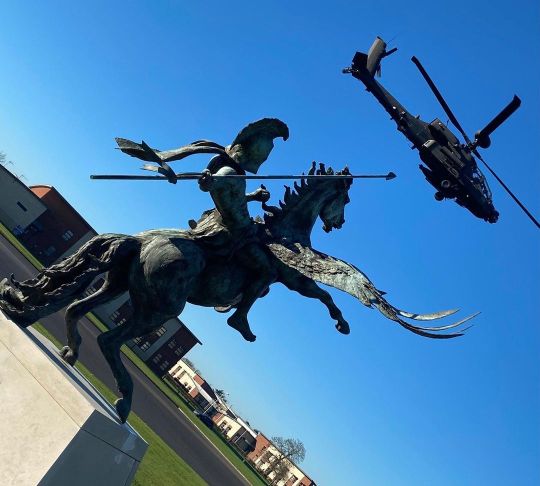
In the twenty-first century, it’s easier than ever to succumb to technological determinism, the idea that science, new weaponry, and globalisation have altered the very rules of war. But military history teaches us that our ability to strike a single individual from 30,000 feet up with a GPS bomb or a jihadist’s efforts to have his propaganda beamed to millions in real time do not necessarily transform the conditions that determine who wins and who loses wars.
True, instant communications may compress decision making, and generals must be skilled at news conferences that can now influence the views of millions worldwide. Yet these are really just new wrinkles on the old face of war. The improvised explosive device versus the armoured fighting vehicle (AFV) or the RPG rocket launcher against an Apache AH64 helicopter are simply an updated take on the catapult versus the stone wall or the harquebus versus the mailed knight. The long history of war suggests no static primacy of the defensive or the offensive, or of one sort of weapon over the other, but just temporary advantages gained by particular strategies and technologies that go unanswered for a time by less adept adversaries.
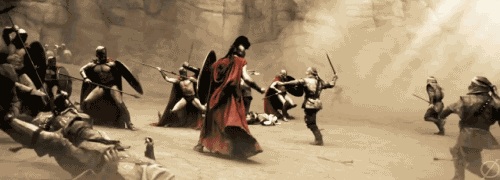
Military history reminds us of important anomalies and paradoxes. When Sparta invaded Attica in the first spring of the Peloponnesian war, Thucydides recounts, it expected the Athenians to surrender after a few short seasons of ravaging. They didn’t - but a plague that broke out unexpectedly did more damage than thousands of Spartan ravagers did. Twenty-seven years later, a maritime Athens lost the war at sea to Sparta, an insular land power that started the conflict with scarcely a navy. The 2003 removal of Saddam refuted doom-and-gloom critics who predicted thousands of deaths and millions of refugees, just as the subsequent messy four-year reconstruction didn’t evolve as anticipated into a quiet, stable democracy - to say the least. Hubris always goes before a fall.

Finally, military history has the moral purpose of educating us about past sacrifices that have secured our present freedom and security. If we know nothing of Hastings, Agincourt, Boyne, Trafalgar, Waterloo, Somme, Passchendaele, Battle of Britain, El Alamein, Imphal, Kohima, Falklands, and Helmand, the crosses in our military cemeteries are just pleasant grey stones on lush green lawns. They no longer serve as reminders that thousands endured pain and hardship for our right to listen to what we wish on our smartphones and to shop online in safety, and to protest for social grievances by desecrating statues - or that they expected future generations, links in this great chain of obligation, to do the same for those not yet born.
Most nations are born through war, reunited by war, and saved from destruction by war. No future generation, however comfortable and affluent (yes, that includes you from the safety of your ivory tower), should escape that terrible knowledge. I don’t enjoy saying that and I certainly don’t revel in it. I only say it because it’s what the span of human history teaches us and what my personal experience of the battlefield has been.

We must all abandon the naive faith that with enough money, education, or good intentions, we can change the nature of mankind so that conflict, as if by fiat, becomes a thing of the past. In the end, the study of war reminds us that we will never be gods. We will always just be men (and women), it tells us. Some men and women will always prefer war to peace; and other men and women, we who have learned from the past, have a moral obligation to stop them. Because if we don’t then something much worse will always meet us further down the line and we may not be able to stop them.
I don’t apologise for my less than rosy view of human nature but long before history littered the battlefields of Marathon and Thermopylae or Alesia and Canae with dead white males, we would do well to heed the words of Cormac McCarthy who wrote in Blood Meridian, or the Evening Redness in the West, “War was always here. Before man was, war waited for him. The ultimate trade awaiting its ultimate practitioner.”

Thanks for your question.
#ask#question#war#military history#western society#greek#roman#civilisation#human nature#human condition#british army#western civilisation#thucydides#personal#heraclitus#classical#history#society#culture
112 notes
·
View notes
Text
Just by the way… I want y’all to remember that the Spartans are attested wearing felt helmets.

#thucydides#spartan#sparta#ancient sparta#ancient greece#lakedaimon#ancient history#greek history#spartan history#armour
28 notes
·
View notes